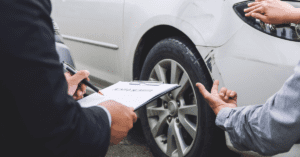Is it worth having fully comprehensive insurance on an old car?
Is it worth having fully comprehensive insurance on an old car?
This might prompt you to ask: is my comprehensive car insurance premium still worth it? The answer really depends on your wheels, but a good rule of thumb is: until the sum of your annual premium and excess outweigh that of your car, it is probably still in your best interests to keep your comprehensive policy. Aug 18, 2021
Does Comprehensive include green slip?
Every certified vehicle has to be covered by CTP insurance, whereas comprehensive car insurance is optional. CTP insurance only protects you from the personal injury liability that might arise if you injure anyone involved in an accident you caused.
Is Utah a no-fault state for car accidents?
Utah is a “No-Fault” state. This means that, no matter whose fault an accident may have been, injured parties seek payment for the first $3,000 of medical expenses from their own insurance carrier. This is dictated by a statute sometimes referred to as the “PIP Statute” which stands for “Personal Injury Protection”.
What happens if the person at fault in an accident has no insurance in Utah?
The insurance company of the at-fault driver will pay for everything. Utah is a no-fault state, meaning your own insurance pays for your initial medical bills up to a certain limit. The limit – also known as the PIP or personal injury protection amount – varies by state. Here in Utah, it’s $3,000. Mar 9, 2020
Is PIP Subrogatable in Utah?
PIP: No. U.C.A. § 31A-22-309(6) (1994) confers “limited, equitable right to seek reimbursement in arbitration” against third-party’s carrier only (includes disputes over fault and/or coverage), unless third-party carrier has tendered policy limits.
Is PIP mandatory in Utah?
Utah requires car owners to carry personal injury protection (PIP) insurance, which pays for medical costs, lost income and other related expenses if you’re injured in an accident. Also called “”no-fault insurance,”” PIP pays for your injuries no matter who was at fault in a collision. Nov 10, 2021
How does PIP coverage work in Utah?
PIP coverage pays for medical bills, lost wages, and lost household services. It only covers $3,000 total, unless you have purchased a higher amount of PIP coverage. Your PIP coverage will cover those bills up to $3,000, no matter who was at fault in your accident.
What happens after PIP is exhausted?
After you have exhausted your PIP coverage, your health insurance will take over to continue paying for your losses up to the policy limits. However, filing a personal injury lawsuit may be an option, too. Oct 13, 2020
What’s the difference between PIP and full coverage?
Liability coverage is the foundation of most car insurance policies. Depending on where you live, full coverage usually includes either medical payments coverage (Medpay) or personal injury protection (PIP). This coverage would pay for medical bills that resulted from a covered accident — up to the policy limit.
What is the best PIP coverage?
We suggest that anyone buying an auto policy should try to secure $10,000 of PIP coverage. This way you know you will at least have the first $10,000 of your medical bills (and possibly lost wages) covered with no questions asked.
What does PIP exhaust mean?
personal injury protection If you are involved in a car accident in Florida and sustain serious injuries that exhaust your personal injury protection (PIP) limit of $10,000, the law allows you to seek additional compensation from the negligent party.
Is it better to have a $500 deductible or $1000?
A $1,000 deductible is better than a $500 deductible if you can afford the increased out-of-pocket cost in the event of an accident, because a higher deductible means you’ll pay lower premiums. Choosing an insurance deductible depends on the size of your emergency fund and how much you can afford for monthly premiums. Jan 26, 2022
Is a $100 deductible good?
But a deductible that is too low might mean paying more premium than you want to. Typically, insurance agents recommend that your comprehensive deductible be between $100 and $500. Comprehensive claims tend to be filed for less damage than collisions, so having a lower deductible is often logical. Sep 14, 2021
Is a 500 deductible good?
It’s best to have a $500 collision deductible unless you have a large amount of savings. Remember, this deductible amount has to be paid every time you make a collision claim. Aug 3, 2021
What happens if I crash my car into a tree?
If your car crashes into a tree and you damage the tree itself, you may also be responsible for removing and/or replacing the tree and fixing any surrounding damage (ruined grass from tread marks, etc.). In many cases, your property damage liability coverage will pay for these costs, up to your coverage limits.






